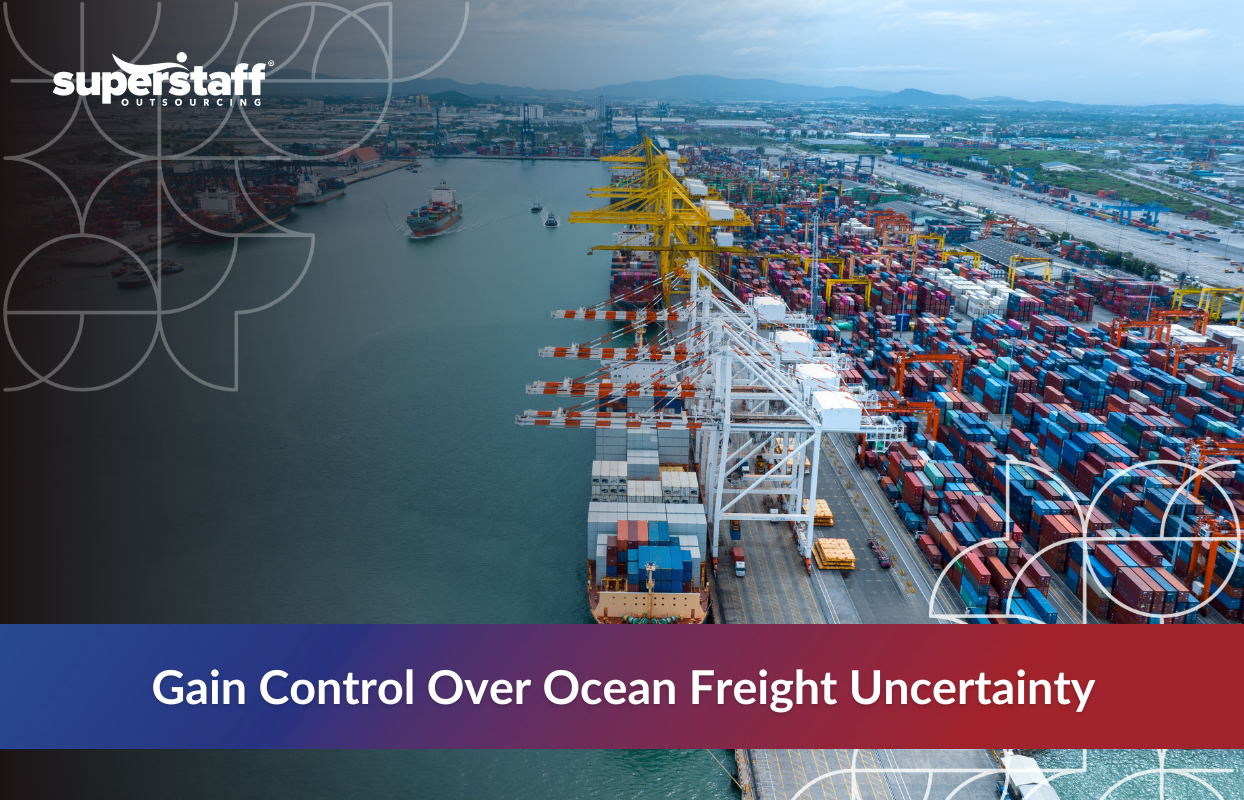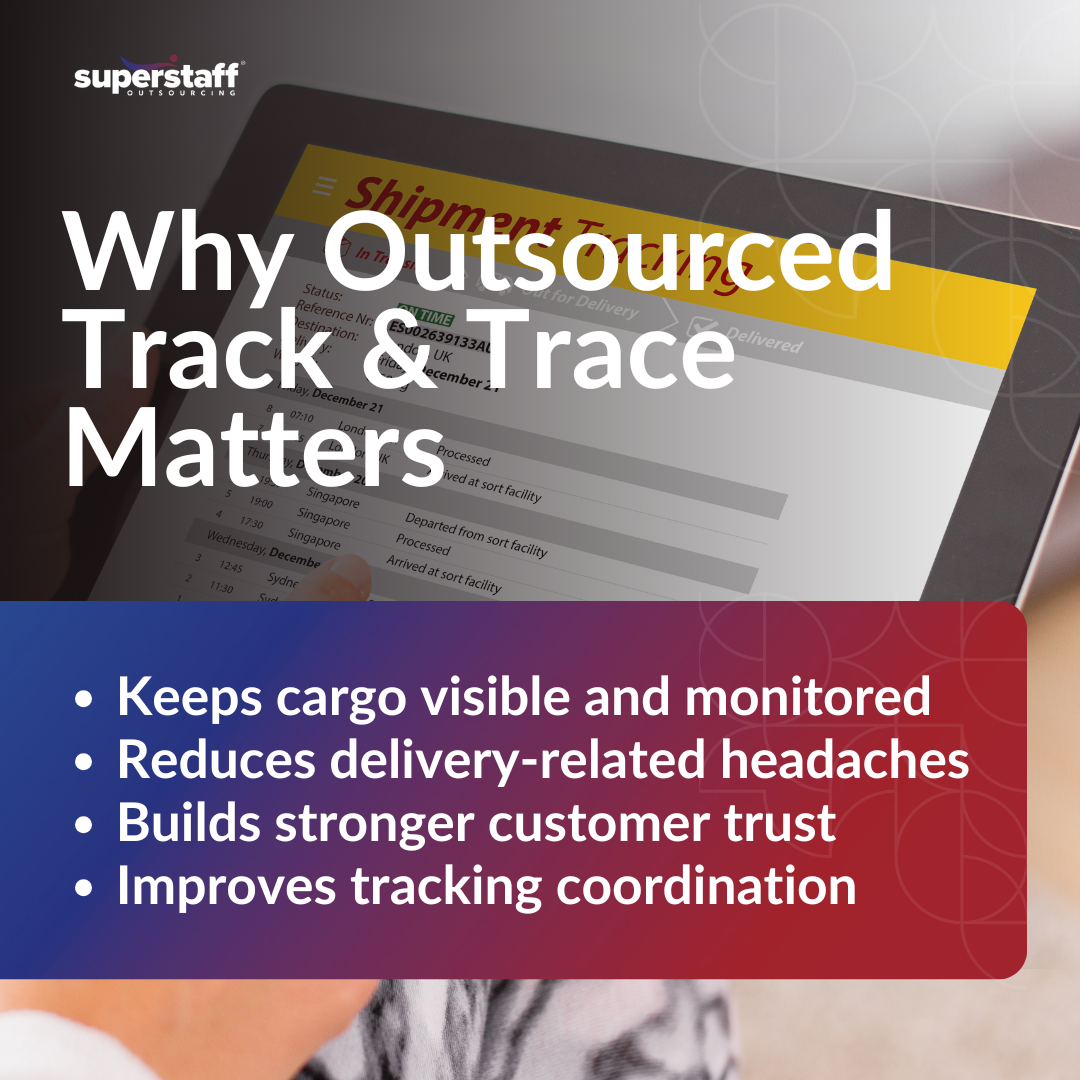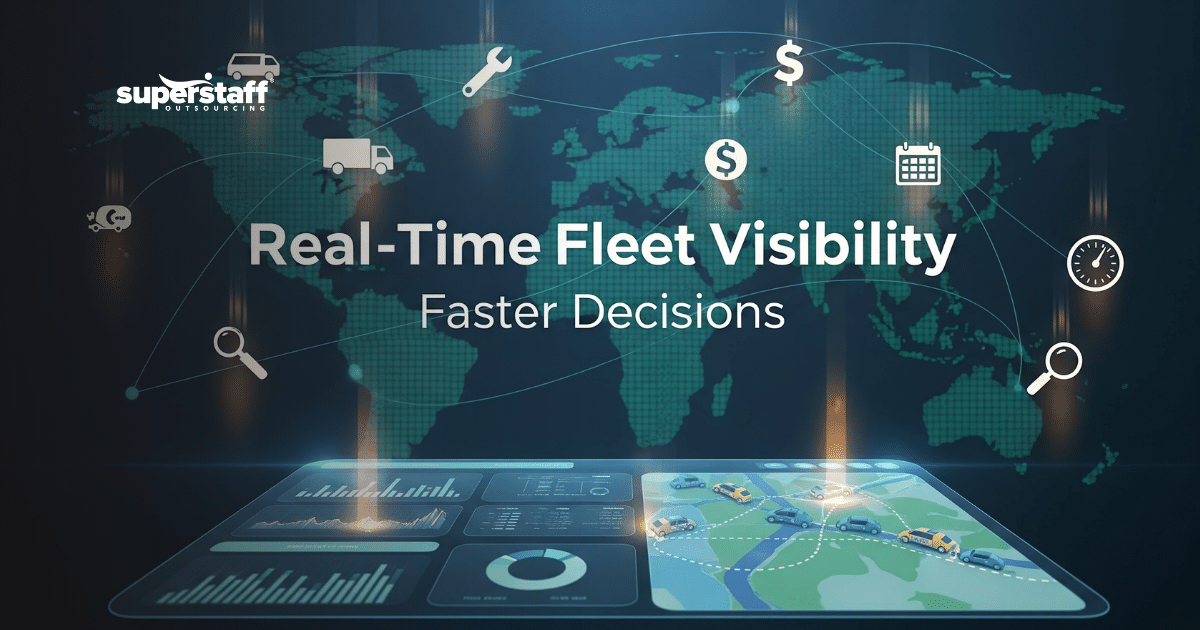
Ocean freight has become increasingly unpredictable—but could freight tracking outsourcing be the stability your supply chain desperately needs?
In recent years, businesses across the globe have felt the weight of supply chain disruption like never before. From pandemic backlogs to climate-related port closures, and most recently, political unrest in shipping chokepoints, the world of ocean freight has rarely seen such instability. For companies relying on cargo to arrive on time, these disruptions aren’t just frustrating—they’re expensive, reputation-damaging, and operationally paralyzing.
For logistics businesses and the companies that depend on them, staying ahead of delays is no longer a competitive edge. It’s survival. And in this new age of unpredictability, outsourced track & trace services have moved from “nice to have” to mission-critical. This article explores why outsourcing your tracking function is the smartest way to inject reliability, efficiency, and transparency into your ocean freight operations.
Why Ocean Freight Has Become Unpredictable
Several global factors have combined to create unprecedented volatility in ocean freight.
Port congestion has reached record highs in major transit hubs, including Los Angeles, Shanghai, and Rotterdam. Labor strikes continue to sweep across dockworker unions in key regions, leading to vessel delays and rerouted shipments. Add to that the increasing intensity of extreme weather events—such as typhoons, hurricanes, and rising sea levels—and you have a recipe for logistical uncertainty.
But the complexity doesn’t stop there. Geopolitical tensions have drastically altered global trade routes. The Red Sea crisis, for example, forced major shipping companies to avoid the Suez Canal entirely, resulting in delays of weeks, not days. Meanwhile, ripple effects from the pandemic still linger, with shortages in containers and inconsistent schedules becoming the new normal. According to Reuters, the giants of this $14 trillion-a-year ocean shipping industry—responsible for handling about 80% of global trade—are now facing amplified risks from rising trade protectionism, including proposed reciprocal tariffs in the U.S.
All of these factors are beyond the control of individual companies, but their consequences land squarely on logistics teams. When you can’t predict what’s happening on the ocean, the only thing you can control is how quickly—and accurately—you respond.
The High Stakes of Tracking Ocean Freight
Accurate track & trace services directly impact operational efficiency and customer trust.
Without visibility into where cargo is and when it will arrive, businesses risk much more than temporary confusion. Inventory mismanagement becomes a constant threat. Missed delivery windows can disrupt entire production schedules or retail rollouts. And in today’s market, where consumers and clients expect instant answers, delayed updates can lead to lost business.
Imagine promising a client a product launch by a set date, only to find out—too late—that your shipment was delayed in a transit port. With no early warning, you scramble to notify stakeholders, losing valuable trust along the way. One delay might be forgivable. Several in a row can damage relationships permanently.
This is the pressure cooker environment that logistics companies now operate in. And as the volatility of ocean freight continues, the stakes only rise higher. For many, freight tracking outsourcing is the key to keeping those stakes from spiraling out of control.
Limitations of In-House Tracking Solutions
Many businesses struggle with in-house track & trace systems during volatile periods.
While internal tracking tools may function well during stable conditions, they often falter when the pressure’s on. Real-time data management requires more than software—it demands continuous attention, technical expertise, and around-the-clock monitoring. For many mid-sized logistics teams, that level of commitment just isn’t feasible.
Moreover, keeping up with evolving tracking technologies can be prohibitively expensive. Cloud-based platforms, AI-powered updates, and predictive analytics all require significant investment and constant upgrades. And even with all the right tools in place, personnel must be trained to interpret data accurately and act quickly in dynamic conditions.
Scalability is another issue. When shipment volumes surge—like during peak seasons or crisis response periods—in-house systems and teams often buckle under the weight. The result? Missed updates, slower response times, and communication breakdowns with carriers and customers alike. These gaps often prompt logistics providers to explore freight tracking outsourcing as a more sustainable, responsive solution.
How Outsourced Track & Trace Adds Reliability

Outsourcing track & trace significantly enhances reliability during periods of unpredictability.
Partnering with specialized service providers ensures that every shipment is monitored by experienced professionals, equipped with best-in-class tools. These providers are focused solely on the art and science of tracking—they aren’t juggling ten other logistics responsibilities. Their sole job is to make sure your freight stays visible, and you stay informed.
Advanced analytics help detect anomalies before they become problems. Whether it’s a delay in customs clearance or a sudden rerouting due to port closures, outsourced track & trace teams respond with speed and accuracy. This proactive approach reduces human error and eliminates blind spots. In fact, as Forbes highlights, just four data points related to time and location are enough to identify 95% of individuals—proof of how powerful timely, precise tracking can be when applied to freight movements.
With real-time shipment visibility, communication flows smoothly between shippers, freight forwarders, carriers, and customers. Issues are flagged early, escalated properly, and resolved with minimal disruption. For companies seeking consistency during unstable times, freight tracking outsourcing brings peace of mind.
Improving Operational Efficiency
Outsourcing track & trace services optimizes operational efficiency for logistics firms.
Repetitive tasks such as status checks, carrier follow-ups, and ETA adjustments can be automated or handled externally. This frees up your internal teams to focus on strategic tasks, such as route optimization, customer service, and contingency planning.
Because issues are identified earlier, resolutions happen faster. This saves countless hours spent troubleshooting or reconciling conflicting data. Resource allocation becomes more precise, helping teams deploy talent and tools where they’re needed most.
For businesses managing complex, multi-modal supply chains involving sea, air, and ground transport, this efficiency is game-changing. Coordinating across modes, time zones, and stakeholders requires flawless information flow—something freight tracking outsourcing makes possible at scale.
Enhancing Customer Experience with Transparency
Outsourced tracking services improve customer satisfaction through greater transparency.
When customers are kept in the loop with real-time updates, it builds trust and reduces the anxiety that comes with waiting. Even if a delay occurs, being informed empowers customers to adjust expectations or make alternate plans.
This transparency also reduces the burden on your customer service teams. Fewer inquiries, fewer complaints, and more informed interactions lead to higher customer satisfaction. Clients no longer have to chase updates—you’re already one step ahead, communicating clearly and proactively.
Transparency isn’t just about visibility—it’s about credibility. In logistics, where accountability matters, being able to say “we know exactly where your shipment is, and here’s what we’re doing about it” creates confidence. And confident customers are loyal ones. Freight tracking outsourcing helps make that level of transparency achievable across the board.
Cost Savings Through Outsourcing Track & Trace
Outsourcing track & trace operations significantly reduces operational costs.
Instead of investing heavily in new tracking software, hiring dedicated staff, or managing 24/7 monitoring teams, businesses can tap into existing outsourcing infrastructure. This converts a capital expense into a manageable, predictable operational cost.
As shipping volumes fluctuate, outsourced services scale accordingly. You’re not paying for unused capacity, nor are you left scrambling during spikes in demand. With flexibility baked into the model, cost efficiency becomes part of your competitive advantage.
And by catching delays earlier, mitigating risk, and avoiding penalty fees or lost customers, the financial upside grows further. Many companies that have adopted freight tracking outsourcing report measurable gains in both savings and service performance.
Outsourced Track & Trace: The Strategic Move Forward
Outsourced track & trace is essential for maintaining reliability, efficiency, and customer trust amid unpredictable ocean freight conditions.
Global logistics is undergoing a sea change—literally and figuratively. Unpredictability is here to stay, but confusion and delay don’t have to be. As traditional in-house methods show their limits, the need for responsive, professional tracking partners becomes urgent.
By investing in freight tracking outsourcing, you gain more than operational support—you gain a competitive edge. From real-time visibility to satisfied customers, from cost control to future readiness, the benefits are clear.
SuperStaff’s logistics support solutions, including outsourced track & trace, help companies like yours stay ahead of global challenges. Let us become your steady hand in volatile times. Contact us today and explore how our offshore teams can bring clarity, continuity, and confidence to your supply chain.






